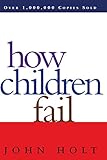Found in 2 comments on Hacker News
tokenadult · 2009-10-12
· Original
thread
How Children Fail by John Holt
http://www.amazon.com/Children-Fail-Classics-Child-Developme...
The Nature of Paleolithic Art by R. Dale Guthrie
http://www.amazon.com/Nature-Paleolithic-Art-Dale-Guthrie/dp...


Qureshi credits John Holt's book How Children Fail
http://www.amazon.com/Children-Fail-Classics-Child-Developme...
with opening his eyes to a different view of education. (The same book was recommended to me by my junior high assistant principal in 1971. How Children Fail was a life-changing book for me, and I recommend it to everyone who has ever been in school.) Qureshi writes, "In the last couple of years, I’ve been going through a process of un-education: removing all the bad habits that school somehow implanted in me:
"Being afraid of failure or embarrassment"
That's crucial. To be afraid to fail is to be afraid to learn. Here's a link to a FAQ I have prepared for my local mathematics students, "Courage in the Face of Stupidity,"
http://www.epsiloncamp.org/CourageandStupidity.php
designed to prevent the kind of misguided approach to learning mentioned in the essay kindly submitted here. School curricula in many parts of the United States (and perhaps elsewhere too, as I note the essay is from Britain?) are designed so that most pupils will succeed in school assignments most of the time. That doesn't provide enough practice in taking on HARD tasks, and inadequately prepares young learners to succeed in either
a) study of more than one really difficult subject at the same time
or
b) successful problem-solving in adult life in private employment, when the problems are often open-ended and ill-defined.
As a parent of four children, and as a teacher of elementary-age pupils, I'm all about first bolstering children's expectations that initial failure is not a sure predictor of never succeeding, and then introducing CHALLENGING problems into their education so that one thing they practice while young is overcoming failure.
AFTER EDIT:
Another top-level comment just asked,
Anyone out there tried home schooling?
Yes. And it was John Holt's writings, beginning with How Children Fail in the early 1970s, that sparked my interest in homeschooling. I have been pleased with the results of homeschooling in the case of my oldest son, now fully grown and making a living as a hacker for a start-up, and I am glad to continue homeschooling for my three younger children.